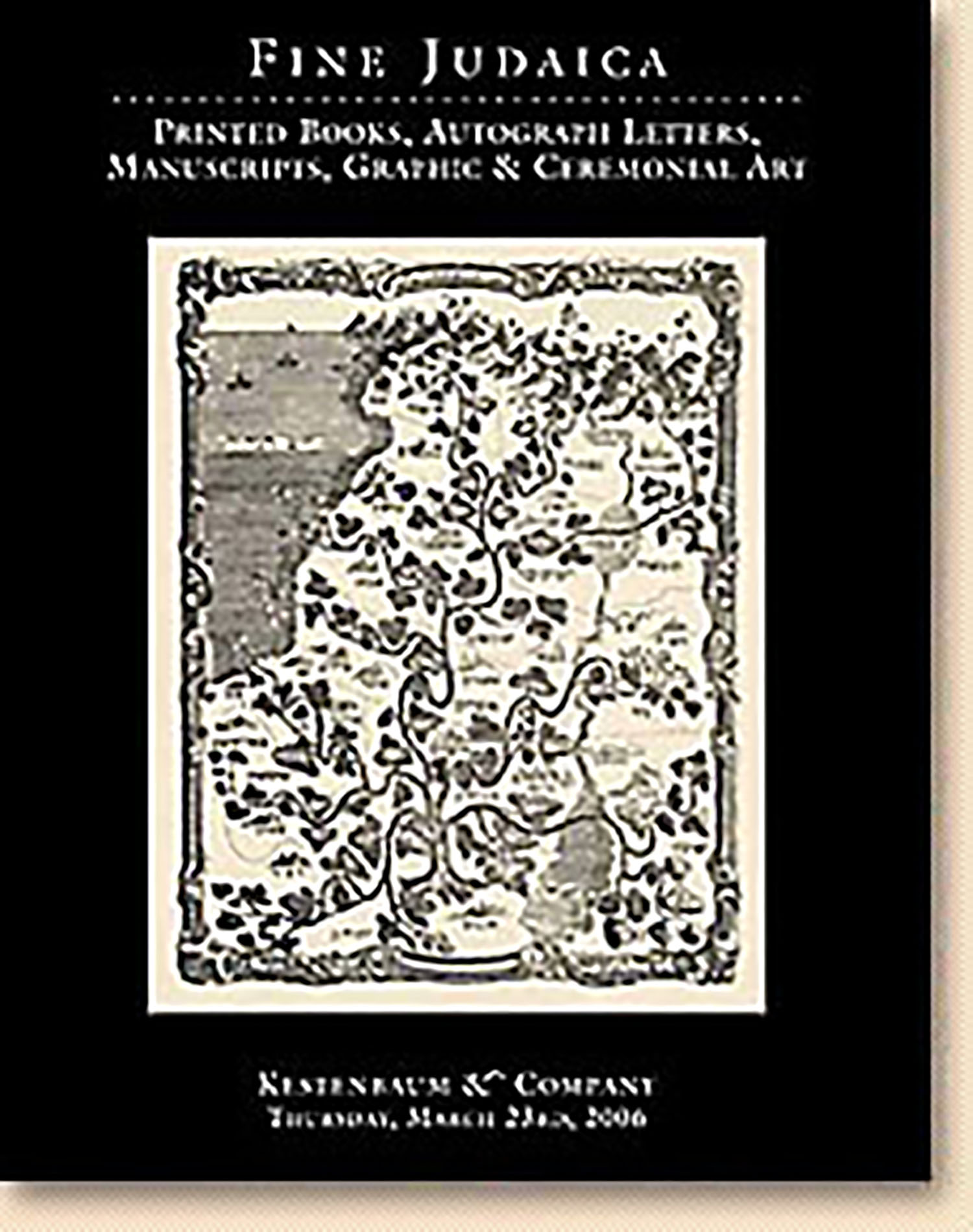Triumpho del Govierno Popular y de la Antigüedad Holandesa

AUCTION 32 |
Thursday, March 23rd,
2006 at 1:00
Fine Judaica: Printed Books, Autographed Letters, Manuscripts, Graphics and Ceremonial Art
Lot 39
BARRIOS, DANIEL LEVI DE.
Triumpho del Govierno Popular y de la Antigüedad Holandesa
Amsterdam: Jacob de Cordova and David de Castro Tartas 1683-84
Est: $40,000 - $60,000
PRICE REALIZED $190,000
Triumpho del Govierno Popular is a singularly important collection of works (“opuscula”), that deal with the institutional, social, cultural and religious life of the Portuguese-Jewish community of Amsterdam from its beginnings at the end of the 16th-century until 1684.
Notoriously rare. No copy known to have appeared on auction in the last 60 years.
No copy in Jewish National and University Library, Jerusalem; Hebrew Union College at Cincinnati; Bibliothèque Nationale, Paris; Biblioteca Nacional, Madrid; or Biblioteca Nacional, Lisbon.
The copy offered here is more complete than both the British Library and the JTSA copies, world-wide, only the Bibliotheca Rosenthaliana is more complete.
Includes the extremely rare Relación de los poetas y escritores de la nación judaica española, the celebrated study on more than fifty Portuguese-Jewish scholars living in Amsterdam and other Marrano communities.
* Records the names, and frequently relevant biographical data, of more than 800 Spanish-Portuguese Jews and Marranos living in Amsterdam, Hamburg, London, Leghorn and the Americas.
* Regarding the Americas, Barrios notes those members of the Jewish community of Amsterdam who migrated to Brazil, Surinam, Jamaica, Barbados, Tobago and Cayenna. He also writes about the martyr Tomás Tremiño de Sobremonte, a physician in the Kingdom of Chile, who openly professed his Jewish identity, was arrested by the Spanish Inquisition at Lima, Perú, in 1617, and subsequently burnt at the stake.
* Contains Hebrew poems by such authors as Isaac Aboab da Fonseca, Solomon de Oliveira, David Nunes Torres, Joseph Franco Serrano and Daniel Belillos.
Triumpho del Govierno Popular is the first, and remains one of the principal sources on early Marranos, not only in the Netherlands, but of Jewish communities throughout Europe and the Americas, providing rich biographical information about hundreds of prominent Spanish and Portuguese Jews.
Much here relates to the early the history of Jews in the Americas: Brazil (Pernambuco, Tamarica [(today, Itamaracá), Curaçao, Surinam and Guyana/Cayenna, Barbados, Jamaica, Tobago, Chile, Perú (Lima), etc. Barrios records those scholars educated by the Portuguese-Jewish community of Amsterdam, who then served as rabbis in the Americas. In addition to Rabbis Isaac Aboab da Fonseca and Moses Raphael de Aguilar, who served in Dutch Brazil between 1641 and 1654, Barrios documents, among others, rabbis Yosiahu Pardo, Haham of Curaçao; Isaac Nieto, Haham of Surinam; Eliau López, Haham of Barbados; Jacob de Aguilar, cantor and rabbi in Brazil, etc. Those with an assocition to Brazil are Paulo de Pina, (alias Rehuel Jessurun), Aron Sarfati, Jacob Lagarto and Eliau Machorro.
Triumpho del Govierno Popular is the principal source for the famous chronicle on the history of the Portuguese Jews of Amsterdam by David Franco Mendes Memórias do estabelecimento e progresso dos judeos portuguezes e espanhoes nesta famosa cidade de Amsterdam [1772], eds. L. Fuks, R.G. Fuks-Mansfeld y B.N. Teensma (Assen: 1975; special issue of Studia Rosenthaliana, 11).
T he Author:
Daniel Levi de Barrios (1635-1701) was a poet, playwright, philosopher and historian, and one of the most eminent exiles of Spanish-Jewish literature. He was born in Montilla, Spain, the son of Simon de Barrios (also known as Jacob Levi Caniso) and Sarah Valle. Following an Auto da Fe in 1655 when a family-relative, Marco (Isaac) de Almeyda Bernal was killed, the Barrios family fled Spain and settled in Algiers and then Nice. Daniel sailed to Tobago, where later, his wife, Debora Vaez, died. He then moved back to the Netherlands, and in 1662 married Abigail de Pina, daughter of Isaac de Pina of Amsterdam. At about the same time Barrios took a commission as a captain in the Spanish Netherlands, and for some time lived outwardly as a Christian in Brussels, while simultaneously maintaining a connection with the Jewish community in Amsterdam. In 1674, Barrios renounced his military commission and thereafter lived openly as a professing Jew in Amsterdam. A follower of Shabbetai Tzvi, Barrios had mystical delusions and often fasted for long periods, he firmly believed that the Messiah would appear on the Jewish New Year of 5435 (1674). He is buried in the famous cemetery of the Portuguese-Jewish community at Ouderkerk aan de Amstel.
His Works:
Barrios was the most fruitful poet among all the Spanish-Portuguese Jews of his time. Hardly a year passed that did not see the publication of one or more of his writings. His principal works are: Flor de Apolo (Brussels, 1665), a collection of comdies and differing poetical forms in the Spanish baroque fashion; Contra la Verdad no ay Fuerça (Amsterdam, 1665-67), a panegyric relating to Abraham Athias, Jacob Rodrigues Caseres, and Rachel Nuñez Fernandez, who were burned as martyrs at Cordova; Coro de las Musas, (Brussels, 1672), an enlarged collection of poems in the fashion of Flor de Apolo; Imperio de Dios en la Harmonia del Mundo, (Amsterdam, 1673), an ambitious religious poem on the creation and harmony of the world; and finally, the present Triumpho del Govierno Popular --.
THE MOST IMPORTANT SOURCE ON THE HISTORY AND LITERATURE OF THE PORTUGUESE-JEWISH COMMUNITY IN AMSTERDAM. WRITTEN BY THE POET-LAUREATE OF THE PORTUGUESE-JEWS.
(Kestenbaum & Company acknowledges the skilled research provided here by an eminent scholar of European History, who wishes to remain anonymous).
